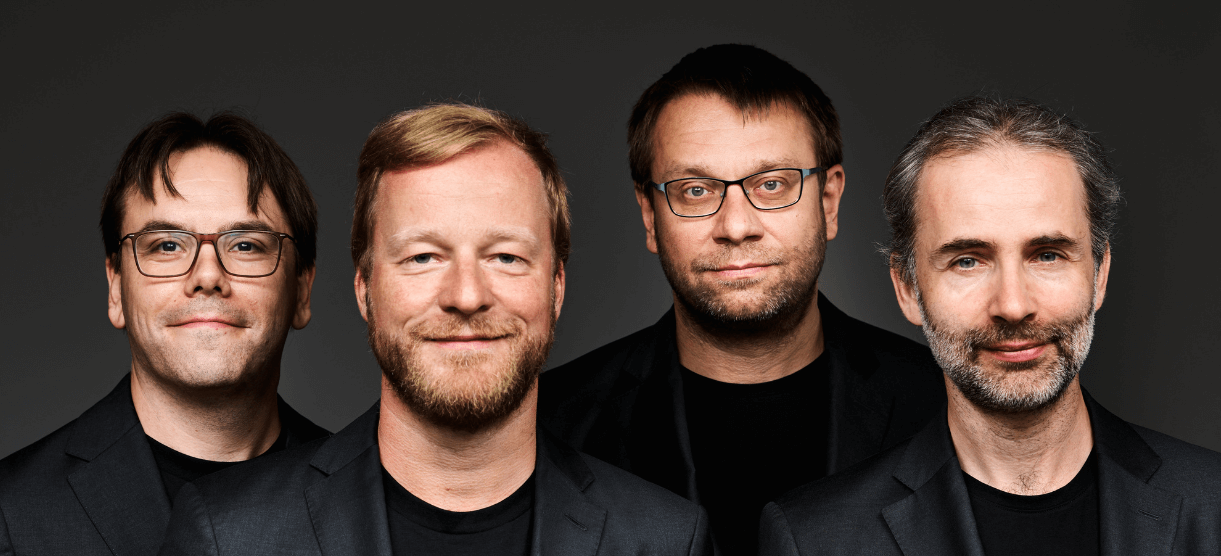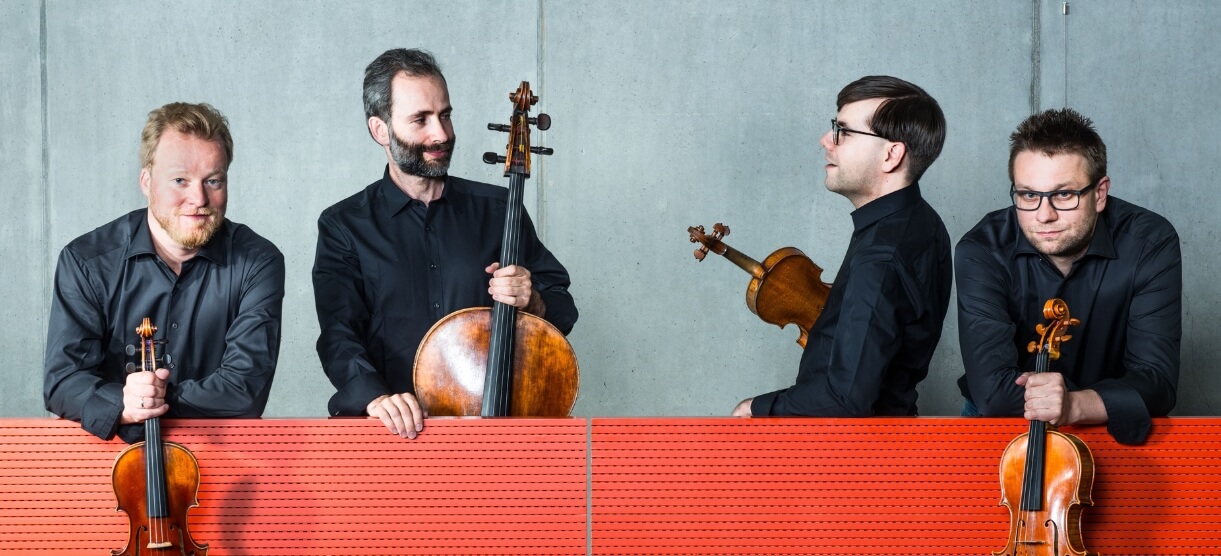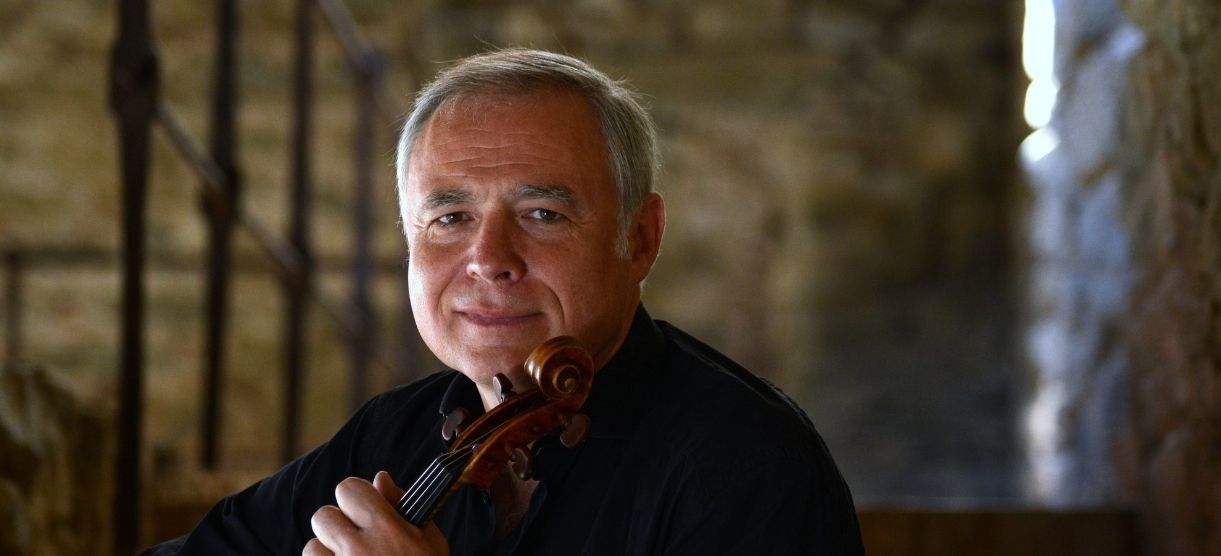
Alexander Zemlinsky: String Quintet in D Minor
Antonín Dvořák: String Quartet No. 9 in D Minor, Op. 34, B. 75
Johannes Brahms: String Quintet No. 2 in G Major, Op. 111
The Zemlinsky Quartet’s contribution to the festival’s Chamber Series will take its audiences from a dreamy mood and melancholy spirit to a confident energy. Antonín Dvořák’s String Quartet No. 9 in D Minor is the centrepiece of the concert: a work resonating with the famous Stabat Mater that infuses it with a somewhat contemplative tone prevalent throughout the composition. A lyrically pensive mood also weaves through the polka and scherzo in this piece of music, which is seldom played despite it being one of Dvořák’s masterpieces.
Having the rare opportunity to hear a piece that is only played once in a while is one of the inconspicuous treats the festival has to offer. Dvořák’s graceful seriousness will be reflected in String Quintet in D Minor written by Alexander Zemlinsky. In the first two movements of his unfinished work, the patron of the top-quality Czech quartet outlined the fickle atmosphere of exited dreaming. String Quintet No. 2 in G major, performed at the end of the performance by the ensemble joined by violist Vladimír Bukač, presents Johannes Brahms as a super-composer who can be so funny and entertaining that it makes one want to dance, while at the same time his form is utterly meticulous and flawless.
Founded in 1994 while the members were still students, the ZEMLINSKY QUARTET has become a much-lauded example of the Czech string quartet tradition. The Zemlinsky Quartet won the First Grand Prize at the Bordeaux International String Quartet Competition in 2010. They have also been awarded top prizes at the Banff International String Quartet Competition (2007), Prague Spring International Music Competition (2005) and London International String Quartet Competition (2006), where they also received the Audience Prize. The Quartet was the recipient of the Alexander Zemlinsky Advancement Award in 2008. Other notable prizes include Beethoven International Competition (1999), New Talent Bratislava (2003), Martinů Foundation String Quartet Competition (2004), and the Prize of Czech Chamber Music Society (2005). In the season 2016/17, the Zemlinsky Quartet was appointed as the residential ensemble of the Czech Chamber Music Society.
The Zemlinsky Quartet performs regularly in the Czech Republic and abroad (Germany, Switzerland, Austria, France, Monaco, Luxembourg, Spain, Italy, Belgium, Great Britain, Ireland, Hungary, Slovakia, Bulgaria, Canada, the USA, Brazil, Japan, South Korea). Recent major appearances of the Zemlinsky Quartet include London’s Wigmore Hall, Cité de la Musique in Paris, the Library of Congress, Place des Arts in Montreal, Prague Spring Festival, and their New York debut at the Schneider/New School Concerts Series. Their vast repertoire contains more than 350 works ranging from Mozart, Beethoven, Brahms, and Dvořák to works by contemporary composers. The Zemlinsky Quartet often cooperates with other renowned Czech and foreign artists (N. Mndoyants, F. Klieser, J. Brown, M. Collins, K. Zehnder, M. Kasík, I. Kahánek, M. Kaňka, K. Untermüller, the Pražák Quartet, the Prague Chamber Ballet, and others). The ensemble also regularly records for Czech Radio. The members of the quartet are also individual prize winners of several competitions (Concertino Praga, Spohr International Competition Weimar, Tribune of Young Artists UNESCO, Rotary Music Competition Nürnberg, the Beethoven International Competition, the Kocian International Competition).
Between 2007 and 2018, the Zemlinsky Quartet recorded exclusively under the French record label Praga Digitals. Their first 4-CD set of Dvořák’s early works for string quartet received the coveted French award, “Diapason d´Or“ prize in March 2007. In 2014, the Zemlinsky Quartet became only the fourth quartet in history to record the complete string quartets by Antonín Dvořák. Other Praga Digitals releases include all the string quartets and early chamber music of Alexander Zemlinsky, a 4-CD set of Schubert’s early quartets, a rare disc of Spanish music for strings, the famous quartets by Haydn, Mozart, and Beethoven, five Mendelssohn-Bartholdy string quartets, works by A. Glazunov, and a relatively unknown but excellent piano quintet by M. Weinberg (in cooperation with the young Russian pianist Nikita Mndoyants). The ensemble has produced two CDs in cooperation with the Pražák Quartet (Mendelssohn-Bartholdy, Strauss, Brahms, Martinů). In cooperation with the Kocian Quartet, the ensemble has recorded the complete string quartets by Czech contemporary composer V. Kalabis. Many recordings of the Zemlinsky Quartet have received universal critical acclaim in various publications such as The Strad, Gramophone, Diapason, and Fanfare magazines.
While students at the Prague Conservatory and the Academy of Performing Arts Prague, the ensemble was coached by members of renowned Czech string quartets including the Talich, Prague, Kocian and Pražák Quartets. The ensemble also took part in several master classes including ProQuartet, in France and Sommerakademie in Reichenau, Austria, where they were awarded First Prize for the best interpretation of a work by Janáček. From 2005 to 2008, the quartet studied with Walter Levin, the first violinist of the LaSalle Quartet. Their recent mentor has been Josef Klusoň, violist of the Pražák Quartet.
Between 2006-2011, the Zemlinsky Quartet were Assistant Quartet-in-Residence at Musik-Akademie Basel in Switzerland. Music education is an important part of their professional life and during their tours, the quartet is often invited to give master classes to students of all ages. They also perform educational concerts for students. František Souček and Petr Holman were recently appointed Professors at the Prague Conservatory.
The Zemlinsky Quartet is named after the Austrian composer, conductor, and teacher Alexander Zemlinsky (1871–1942), whose enormous contribution to Czech, German and Jewish culture during his 16-year residence in Prague had been underrated until recently. His four string quartets (the second one being dedicated to his student and brother-in-law Arnold Schönberg) are part of the basic repertoire of the ensemble. Since 2005, the quartet has maintained a special relationship with the Alexander Zemlinsky Foundation in Vienna.
source: zemlinskyquartet.cz

Vladimír Bukač is one of the foremost viola players in the Czech Republic. He was born in1964 and started playing violin at a very early age, continuing his studies with Nora Grumlikova at the Conservatory and the Academy of Performing Arts in Prague and then with Wolfgang Marschner at the University of Music in Freiburg, Germany. Already during his studies Bukač gained attention by winning prizes in several domestic and international competitions.
Between 1990–1993 Vladimir Bukač was engaged in Japan as a soloist and chamber musician, performing in all prestigious venues of Japan, as well as touring Australia and New Zealand. After returning to Europe Vladimír Bukač was invited to join the renowned Talich string quartet, (1993–2017) which has been considered for many years to be one of the worlds´s finest string quartets. Over the past few decades, the Talich string quartet has been representing Czech musical art through the whole of Europe, Japan, North & South Americas, and South Korea, making dozens of rewarded records, and giving master classes world-wide. After finishing his quartet career in 2017, he devoted himself to solo & chamber music performances and more to pedagogical activities. Since 2002, Vladimír Bukač has been a much sought-after professor at the University of Music in Dresden and since 2016 at the Conservatoire royal de Bruxelles.
He is repeatedly invited to the juries of major international competitions (L. Tertis, ARD Munich, etc.).
In addition, he is the artistic leader of the master classes organized by the Czech-French Academy in Telč (www.akademietelc.cz). He is regularly invited to music festivals not only in Europe (Helsinki, Sardinia, Prades) but also in Japan, Israel, and the USA, where he collaborates with important artists. The concert of the “International recitals” series for the BBC from Bristol, England, broadcast live to 60 countries, was particularly well received.
His rich viola repertoire includes compositions and concerts of all styles, many of which are recorded on CDs or Czech Radio and the BBC. An exceptional recording can be considered a complete performance of M. Reger’s Suit and a recording of a concert by B. Bartók, B. Martinů with the Czech Radio Symphony Orchestra, which was ranked among the TOP 10 CDs of Gramophone 2007. He made the very first recording ever of all sonatas for viola and piano composed by Jindřich Feld, of the concerto by A. Stamic in B flat major and the very first world recording of the viola concerto by F. Domažlický, composed in 1966, in collaboration with the Czech Radio Symphony Orchestra. He made several acclaimed recordings on viola for the Czech Radio and BBC. Some of his CDs were voted one of Classic CD magazine’s “Choices of the Month” and were also praised with similar enthusiasm from The Strad Magazine and the Gramophone.
He plays an Italian instrument built in the workshop of two important masters – Santini Lavazza & G.B. Guadanini, Milan 1725/75.

The Convent of St. Agnes in the 'Na Františku' neighbourhood of Prague's Old Town is considered the first Gothic structure not only in Prague but in all of Bohemia. It was founded by King Wenceslas I in 1233–34 at the instigation of his sister, the Přemyslid princess Agnes of Bohemia, for the Order of Saint Clare which Agnes introduced into Bohemia and of which she was the first abbess. The convent was preceded by a hospital. The 'Poor Clares' originated as an offshoot of the Order of St. Francis of Assisi, and the convent was at one time known as the Prague Assisi. Agnes was an outstanding figure in religious life of the thirteenth century. Besides this Clarist convent she also founded the only Czech religious order – the Hospital Order of the Knights of the Cross with the Red Star. She was canonized in 1989.